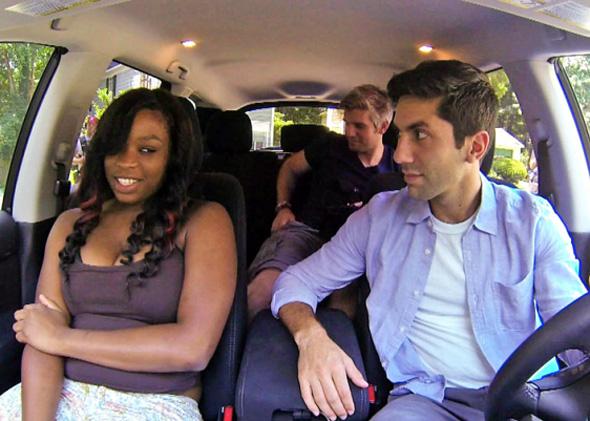We live in a paranoid, anxious age. The government collects all our Gchats one week and then frustratingly sets its status to “away” the next; we are told that quinoa is the perfect protein and then that we consume perfection at the expense of South American farmers. But one threat looms above all these in this dark time—the fear of spoilers.
To even begin to reference, in perfectly well-meaning conversation, the most recent happenings on a popular television show is to risk someone slamming their hands to their ears amid convulsions and screaming “Noooooo!” while stumbling for the door. (This happened to a Scandal fan in a recent Slate editorial meeting—I am still shaken by that victim’s wailing.) Of course, many (if not most) people have long found much of the pleasure of narrative entertainments in the delight of surprise; the ending of a dramatic film or the twist of a good mystery novel are sacred objects, only to be revealed to seekers when they themselves are ready. But such purity of experience is difficult when the place of worship is overrun by live-bloggers and show-tweeters and Facebook updaters—the clamoring money changers of our modern media temple.
But should we, with messianic righteousness, rush to cast these alleged miscreants out onto the street? Or should we, perhaps, show some charity, attempt to understand the mitzvah that their “spoiling” might represent?
You see, my anxiety is of a different sort, but it happens to be one that the spoilers can assuage easily. As someone who aspires to be an active participant in the “cultural conversation,” there are just too many things “one should have watched” to do it all myself. (Note that I’m just sticking to TV here; movies, books, and the other arts make matters even worse.) It used to be that you could read a few Great Books in college, check out Johnny Carson, watch a quality drama here or a must-see comedy there, and be basically set for a life of cocktail partying. But now we all must be as conversant in myriad prestige cable offerings as we are in The Simpsons’ Halloween special. Oh, and did you see Syfy’s most recent predator/natural disaster mashup? Well of course you caught that limited-run reboot of Ab Fab. And what did you think of that Stephen King miniseries about the alien cake plate that everyone is talking about?
I thought nothing, because I didn’t have time to watch it, what with feeding and bathing and resting myself and trying to occasionally revisit what silence sounds like. If you’re honest with yourself, you almost certainly don’t have time to watch everything you’re “supposed to” either, which is why a skilled spoiler should be your favorite person in the world. They are providing you a beautiful service—the ability to “spoil-watch.”
Consider, as a case study, my friend Brandon. Brandon is an avid viewer of MTV’s Catfish, which is a show I find intellectually engaging and enjoyable, but can’t justify including in my media consumption schedule with any regularity. But luckily I don’t have to, because each week, Brandon takes to Facebook and provides a delightful play-by-play mixed with his own brand of sassy commentary. Because I know Brandon will do this, it is now my custom to check his feed sometime after the broadcast, not only to learn the gist of what happened in the episode, but also to derive even more pleasure than I would have from the show itself, thanks to Brandon’s incisive comments. I get all the joys of Nev and Max and Brandon—in a fraction of the time! Why are people afraid of this, again? In a perfect world, we would all be spoiling for each other, and everyone would be freer and happier.
But maybe you’re still scared of knowing. I’ll allow that part of spoiler-acceptance is a matter of constitution: I have never much cared about knowing the endings of movies before I see them or stories before I read them. In fact, if I can gain some assurance ahead of time from a trusted source that a story will pay off to some degree in the end, I am much more likely to fit it in. Obviously, flops can be avoided as well. But spoil-watching works best as a prophylactic against mediocrity in shows of middling appeal, like, say, Catfish or Once Upon a Time or late True Blood. There is nothing worse than sitting through a whole episode of something you could already take or leave only to find that it has taken your time and left you in the gutter of dissatisfaction. Far better to spoil-watch such a program through Twitter or Facebook with a few mouse scrolls and perhaps revisit it when better episodes come along.
In truth, if the spoiler does her job well, you will leave with an appreciation of the episode at least equal to, if not better than, those poor souls who gambled their lives watching the whole thing. Memory is organized in flashes, moments, and a few pithy, secondhand ones recounted on a newsfeed are, considering cost-benefit, preferable to recording some myself over a long hour. (And honestly, I find the practice so seamless that I often can’t remember whether I actually watched something or spoil-watched it.)
You could say that, in my support of spoil-watching, I’m arguing for a CliffsNotes approach to television—and why not? Every good student knows there are texts worth reading in full and texts for which it is perfectly appropriate, even necessary, to skim. As students of pop culture, we should jealously guard our time with the former and, each according to his taste and ability, help each other get on with the latter as quickly and efficiently as possible. Such a utopian arrangement won’t spoil anything, I promise.
